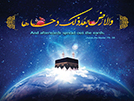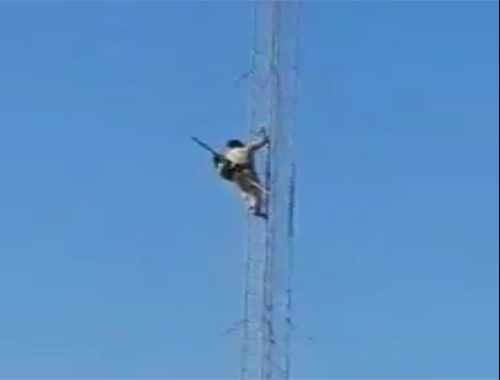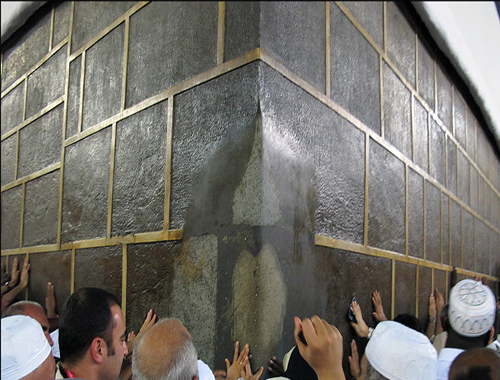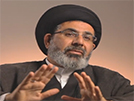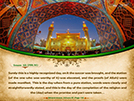Verses 17-26
- Details
- Hits: 2362
Sura Qashiyah
(The Overwhelming Event)
No.88 ( Verses 17-26)
(17) أَفَلَا يَنظُرُونَ إِلَى الْإِبِلِ كَيْفَ خُلِقَتْ
(18) وَإِلَى السَّمَاءِ كَيْفَ رُفِعَتْ
(19) وَإِلَى الْجِبَالِ كَيْفَ نُصِبَتْ
(20) وَإِلَى الْأَرْضِ كَيْفَ سُطِحَتْ
(21) فَذَكِّرْ إِنَّمَا أَنتَ مُذَكِّرٌ
(22) لَّسْتَ عَلَيْهِم بِمُصَيْطِرٍ
(23) إِلَّا مَن تَوَلَّى وَكَفَرَ
(24) فَيُعَذِّبُهُ اللَّهُ الْعَذَابَ الْأَكْبَرَ
(25) إِنَّ إِلَيْنَا إِيَابَهُمْ
(26) ثُمَّ إِنَّ عَلَيْنَا حِسَابَهُمْ
17. Do they not look at camels, how they are created?
18. And at the Sky, how a ts raised high?
19. And at the mountains, how they are ftxed firm?
20. And at the Earth, how it is spread out?
21. Therefore do thou give admonition, for thou art one to admonish.
22. Thou art not one to manage (men's) affairs.
23. But whoever turns back and disbelieves,
24. Allah will punish him with a mighty punishment.
25. Surely to Us will be their Return;
26. Then surely upon Us will be the taking of thefr account.
Commentary:
Look at the Camd; a Sign of Allah.
In the commentary of the last verses, there was a broad discussion about Heaven and its blessings. The next verses refer to 'the knowledge of Allah'; the necessary key that enables us to obtain those blessings. In these verses, four examples of Allah's signs of power, in His wonderful Creation, are mentioned. Meanwhile, they point to Allah's endless power which can be a solution to the question of Resurrection.
First, we are encouraged to observe camels:
Do they not look at camels, how they are created?
The first thing mentioned is a domesticated animal; the camel. But, why is the camel mentioned first and before all others? Commentators have put forth many ideas, but it is clear that in the beginning, the Arabs of Mecca were addressed; those who often dealt with camels in their everyday lives more than any other animal.
Moreover, this animal has some wonderful characteristics which separate it from other animals, and truly he is one of the signs of Allah. Some of these characteristics are as follows:
1. Some of the domesticated four-footed animals are useful only for their meat, some others mostly for their milk; the rest are used only for riding or carrying loads, hut the camel is used for all of them. The flesh can be eaten. The milk can be used. It can carry men, goods, and so on.
2. The camel is the strongest and the most persevering domestic animal which can carry heavy loads. It is also a wonder that when it is heing on the ground and loaded heavily with goods, it can rise easily, in a motion, while other beasts cannot do so.
3. The camel can bear thirst for a long time (about seven to ten days), and can remain hungry for a time, also.
4. The camel can travel a long distance, every day, on impossible roads and sandy deserts where no other animal can, and that is why the Arabs call it the 'ship of the desert'.
5. The camel can live on a diet of thorny plants, so, its food is inexpensive, and it is also a valuable asset when one wants to purchse a camel, because it is one of the least expensive beasts of burden.
6. Having this wonderful structure, the camel is par excellence for the sandy deserts where terrible storms hurt the eyes and ears, because Allah has created him with special eyes, ears, and nose that allow him to continue to walk through the blowing, stinging sand, and its limbs are adopted to this life, as well.
7. The camel is a very gentle animal. It is so gentle that a little child can hold the lead-rope of a string of camels and take them wherever he or she wishes.
In short, the specialities of this animat' are so amazing that anyone who takes into consideration its creation realizes that the Creator of the animal; his Creator, is very great. In the case men neglect the and think of it as of no account, they are asked, in the Qur'an, to contemplate on the camel which they can see in their everyday lives and which is full of meaning in its unique design and is of the goodness Allah bestows upon Man.
It is quite clear that the word 'look' in the verse does not mean a simple look, but it means 'a careful look' with deep contemplation.
Attention is then paid to the second sign; the sky, and it says:
And at the sky, how it is raised high?
The lofty sky with its wonders: bright stars, galaxies and all other beauties that attract everyone's attention so that one, comparing himself with this great and glorious universe, which is full of order and regularity, finds himself as if he is nearly nothing before the Creator of them, the Infinite.
How wonderful these great celestial bodies are fixed on their orbits! They have no pillars, but stand firm. Stars and planets in the solar system are millions of years old, but their orbits are unchanged.
Although the creation of sky has always been a wonder, its facts seem more surprising and its glory glitters more brightly, today, than ever before under the light of recent scientific investigations and amazing explorations.
Are we not to contemplate on the Creator and the Wisdom of this great world and approach the main goal of its creation?
* * * *
Then our attention, which was previously attracted to the sky, is turned to the ground and says:
And at the mountains how they are fisxed finn ?
Mountains, whose underlying formations have joined to each other and have formed a shell over the earth, work like a shield against the inner shaking resulting from moulten lava and outer fluxes and refluxes produced by the gravities of the moon and the sun.
If these safe shelters and storm controllers, the mountains, were not on the ground, there would be only deserts all over the earth.
Mountains store wholesome water for both Man and green plants. High mountains symbolize granduer and generosity as well as grace and blessings. Perhaps this is why Man can meditate and contemplate, there, better than at any other place, and perhaps it was for the same reason that the holy Prophet (p.b.u.h.) spent a lot of his time praying in 'Jabal-un-Nur' and the cave of Hirra in the side of Mount Hirra near 'Arafat before his appointment to prophecy.
The term /nasabat/ is based on /nasb/ which means 'to place, fix, erect', and it may touch on the conditions of the creation of the mountains, at the beginning. The science of geology considers some various factors for the formation of different kinds of mountains:
1. Mountains are formed by folds in the earth.
2. Mountains are formed by volcanos.
3. Mountains are formed by erosion.
4. Mountains are formed in the seas by sediments and the remains of animals.
Each of these id!as is noteworthy for the formation, merit, and grandeur of mountains. They are good signs of Allah's power for those who pay careful attention.
* * * *
Then, attention is paid to the Earth and says:
And at the Earth, how it is spread out?
Man should look at the earth and how rain washes the mountains away, continually, and spreads their dust into furrows and makes the land both level and fit for him to farm or to build houses on.
Suppose the Earth were totally covered with hills and valleys. How difficult would it be to live on? Who had made it smooth and flat for our use before we came to being? The Holy Qur'an advises us to contemplate on these facts and find the real answers.
Here, there is a question about what kind of relation there is between these four things: the camel, the sky, the mountains, and the Earth.
In his commentary, Fakhr-i-Razi says: This is because the Qur'an was revealed in the Arabic language. Arabs often traveled here and there since they did not have enough farm lands and agricultural products for their lives. Those trips were made on camels. When they were travelling in the frightful lonely deserts, where there was no habitant to talk with and nothing to look at or to listen to, they would contemplate on: the wonderful camel, the only animal they were riding on; the sky, the only vault they could see high above them; the mountains they had on their right and left; and the Earth, their only companion when they looked down.
It seems as if Allah makes them contemplate on these four things (naturally) when they are alone. (1)
If we think about Islam, not only for the people of the Arabian Desert, but also as a religion for the people of a very vast environment, the four things mentioned, in these verses, can be considered as the basis of Man's life; besides water and air, we receive our light and warmth from the sky. The Earth is a bed for the growth of different kinds of food products. The mountains are the site of quietude and the storing of water, as well as minerals. And the camel is a good example, from domesticated beasts, which humans can use.
Therefore, these four things contain both agricultural and industrial affairs and contemplating about them takes Man to the thought of their Creator and causes him to be thankful to Allah; this contemplation is his beginning step towards the knowledge of the one god; Allah.
* * * *
After this monotheistic description; it addresses the Prophet (p.b.u.h.) and says:
Therefore do thou give admonition, for thou art one to admonish.
* * * *
Thou art not one to manage (men's) affairs.
Verily, the creation of the sky, earth, mountains, and animals indicate that there is a plan and purpose for the creation of Man and the world. The Prophet's mission is to make people acquainted with the goal of that creation, with his admonishments and lead them to the path of development and nearness to Allah.
Of course, the path of development is paved when they do it willingly and without any outer forces, otherwise it is meaningless. The Prophet (p.b.u.h.) cannot force them to obey Allah, and even if he could, it would be useless.
Some have supposed that this instruction has been abrogated when the verses of the command for Holy War were revealed.
What a great mistake! The Prophet's mission for publicity of Islam and admonition began from the early days of his prophecy and continued until the last moments of his life. It has been continuing since then; at first by his sinless successors and then by the Islamic scholars. This responsibility will never stop. The lack of obligation on the people, in accepting Islam, is also a permanent principle. However, Holy War is different. The goal is mainly to stand against transgressors and remove the hindrances from the path of true believers.
This matter is somewhat similar to that of Sura Nisa, No. 4, verse 80 which says: ...But if any turn away, We have not sent thee to watch over their (evil deeds). It is the same in Sura An'am, No. 6, verse 107 and Sura Shura, No.42, verse 48.
The term /musaytir/ is based on /satr/ 'a line of a book or writing' and means 'a person who arranges the lines of a book 'or' one who has absolute authority over a thing or a person and writes down its manner of action, or makes him do something by force'.
* * * *
In the next verse, as an exception, it says:
But whoever turns back and disbelieves,
* * * *
Opinions are divided about the commentary of this 'exception': The first idea says that the exception is from the object of the verb /fathakkir/ to 'give admonition'. Accepting this, it means 'you do not need to give admonition to the enemies who reject Allah and do not take your advice'. This is similar to what is said in Sura Zukhruf, No. 43, verse 83: So leave them to babble and play (with vanities) until they meet that Day of theirs, which they have been promised.
The second idea denotes that if the sentence is considered as a conditional sentence, there is something omitted in the sentence and hence the meaning is, 'Do thou give admonition, because admonishment is useful for all, unless they are enemies of Allah'. It is similar to what is said in Sura A'la, No. 87, verse 9:
Therefore give admonition in case the admonition profits (the hearer).
The third idea says that the exception is from the pronoun /'alayhim/ in verse 22, then it would mean: 'Thou art not one to manage (men's) affair, except in so far as you receive authority to do so against those who reject Allah and do wrong with you.' This commentary seems more agreeable.
The 'exception' may be unrelated; if so, the meaning is: 'But those who turn back and reject Allah, He has authority over them, or He will punish them with a mighty punishment'.
'Mighty punishment' is the punishment in the Hereafter and is compared with the punishment in the present life as it is said in Sura Zumar, No.39, verse 26: So God gave them a taste of humiliation in the present life, but greater is the punishment of the Hereafter,...
It is probable that the purpose of the 'mighty punishment' is a definite intensive punishment in Hell for some sinners in the Hereafter, because the punishment of all evildoers will not be the same in Hell.
* * * *
At the end of the Sura, it says with a threatening tone that:
Surely to Us will be their Return;
* * * *
Then surely upon Us will be the taking of their account.
This is, in fact, a kind of consoling for the Prophet (p.b.u.h.) in order for him not to be upset about their obstinacy and to keep his responsibility in view. It is also a threat for all those who are obstinate in understanding who it is that will reckon with them.
Thus, Sura Qashiyah, which began by speaking about the Hereafter, ends by speaking about the Hereafter also, but in between, 'monotheism' and 'prophecy', are discussed which is the basis of Resurrection. Meanwhile, in the beginning verses, a portion of the severe punishments for the evildoers, and then a great part of the rewards of the good-doers are mentioned. By the way, people are free either to believe and follow the way or not, but they are warned that their return will certainly be to Allah and it is He Who will take care of their account.
Therefore, it clearly states that the Holy Prophet (p.b.u.h.) is sent to teach and direct people on the way and he is not responsible for people's rejections and corruptions. All prophets of Allah have been commissioned in like manner.
Supplication:
O Lord! On the Day that all human beings will return to you and upon you will be the taking of their account, bestow your Grace on us.
O Lord! Save us from the mighty Punishment on That Day.
O Lord! Your heavenly blessings, a few of which You described for us in this Sura, are very valuable and encouraging. If we do not deserve them, with Your beneficence, please bestow them on us.
(1) Tafsir Fakhr-i-Razi, vol.31, p. 158.
The End of Sura Qashiyah
(The Overwhelming Event)

